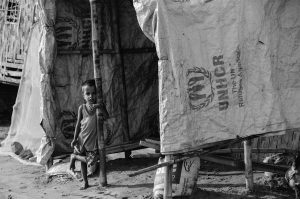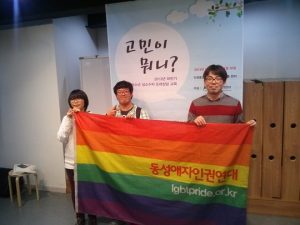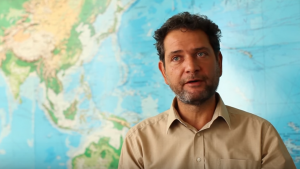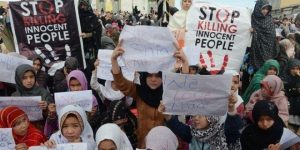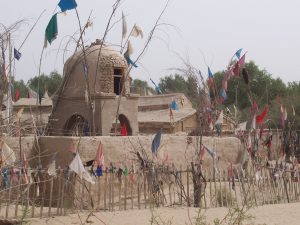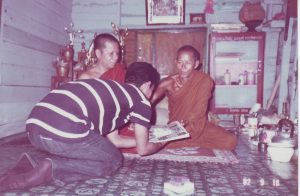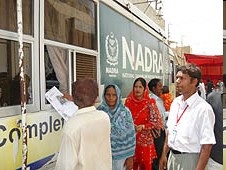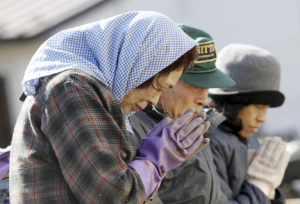Religious Nationalism in the New Myanmar
Memo #372 By: Ian Mcdonald – ian.mcdonald [at] alumni.ubc.ca Although media depicted the November 2015 elections in Myanmar as a chance for reform in the country, the actual changes have been questionable, especially for the Muslim Rohingya in the westernmost state, Rakhine. So what have the election results meant for Muslims in Myanmar? The answer is […]
To Be Queer and Christian: Organizing for Queer Youth in Korea
Memo #270 By Joseph Yi – joyichicago [at] yahoo.com & Daniel Payne – koreanrainbow [at] gmail.com South Korea has among the highest rates of suicide among developed (OECD) countries, peaking at 28.4 per 100,000 people in 2011. Hidden among these tragedies are LGBTQ (Lesbian, Gay, Bisexual, Transgender, Queer), whose sexuality is often rejected by Korean […]
Professor Halkias Talks Pure Land in Tibetan Buddhism
Memo #263 Featuring Georgios T. Halkias A few months ago the Asia Pacific Memo sat down with Dr. Georgios T. Halkias a noted scholar of Pure Land Buddhism, particularly of the Himalayan region, and the author of Luminous Bliss, A Religious History of Pure Land Literature in Tibet (University of Hawai‘i Press, 2012). He was a […]
Elections, Illiberal Politics & Sectarianism in Pakistan: Pogroms against Hazara Shia
Pakistan will hold national elections in May 2013, marking the first time a civilian government completes a full five-year legal term. No small achievement for a nation that since 1947 has been marked by military coups and weak civilian rule. There are reasons to feel encouraged: constitutional reform promoting more balanced center-provincial institutional and political architectures, a media operating with fewer restrictions, and an increasingly independent judiciary all point toward the possibility of genuine consolidation of democracy. But the path ahead is challenging. The resurgence of sectarian violence and an electoral alliance between a key national party and sectarian militants points to a new dynamic.
Islamic Roots of Identity in Xinjiang, China
Memo #188 – Among the numerous cultural restrictions aimed at China’s Uyghur population, the Chinese government focuses particularly intently on control of religious activities. This past Ramadan saw an increase in state-imposed restrictions on ordinary Islamic practices among the Uyghurs. Since Beijing proclaims support for a distinct Uyghur identity while suppressing Islamic practices, it is worth reconsidering the historical connections between identity and Islam among the Uyghurs and their ancestors.
Buddhist Monks and Militant Violence in Laos
Memo #185 – Many, especially outside Asia, are under the mistaken impression that Buddhists are inherently non-violent, especially in comparison with other world religions such as Christianity and Islam. Despite this impression, violence is often linked with Buddhism and perpetrated by Buddhists. Monks in Theravada lineages are not allowed to directly engage in violence, but some have become involved with militancy. Although I am unaware of any Lao monks who have directly participated in violent acts, a few have been shot in Thailand by those opposed to them for providing support to insurgents. This indicates that their support is perceived as substantial and significant.
Ending Islamic Solidarity in Post 9/11 Pakistan: New Restrictions on Migrants
Memo #100 – The rise of the “security state” is not just a Western phenomenon. Post 9/11 Pakistan has seen a proliferation of new surveillance technologies that created social divisions and marginalized long-term migrants previously welcomed in the name of Islamic solidarity.
The Indonesian Model: Learning from a Muslim Majority Democracy
Memo #86 – With the old autocracies of the Middle East falling and new regimes yet to emerge, policy makers are grasping for models that can inform analysis. U.S. President Obama has proposed the ‘Indonesian model.’ The logic is straightforward: Indonesia is a majority Muslim country that has transitioned from a military dominated autocracy to a democracy.
Missionaries Infiltrating North Korea: How Long Can the Hermit Kingdom Avoid Reform?
Memo #77 – On April 11, 2011, the US State Department confirmed North Korea’s intention to prosecute an American, Jun Young-su, held since November 2010 for proselytizing. Another American missionary, Aijalon Gomes, was prosecuted and released in August 2010, following the February 2010 release of missionary Robert Park. A fascinating juxtaposition emerges: while more than one thousand North Koreans risk their lives to escape the hermit kingdom each year, outsiders risk severe punishment to enter the country to preach Christianity, with little evidence that missionaries in general receive leniency.
Japanese Buddhism After the Earthquake: Memorials, Spiritual Comfort, and Emergency Response
Memo #69 – On the 7th day after the earthquake, at precisely 2:46 p.m., sirens rang out along Japan’s northeastern coast. Millions paused, placing their palms together and bowing their heads to remember those who were lost. In the Japanese Buddhist funerary cycle, the living perform rites for the dead every 7th day, continuing until the 49th day after death. Spirits of the deceased are believed to spend 49 days traveling to their next rebirth. As communities transition to harsh new realities, Japanese Buddhist groups are hard at work in expected ways, performing memorials for those lost and comforting those displaced. Perhaps unexpectedly, they are also organizing an effective emergency response.
